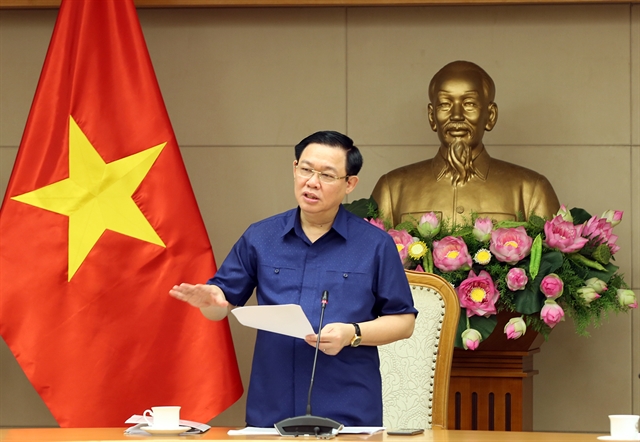Deputy Prime Minister Vuong Dinh Hue has asked ministries, sectors and localities to maintain the consumer price index (CPI) at between 3.17-3.41 per cent in 2019.

Deputy Prime Minister Vuong Dinh Hue has asked ministries, sectors and localities to maintain the consumer price index (CPI) at between 3.17-3.41 per cent in 2019.
The Deputy Prime Minister chaired a working session with the National Steering Committee on Price Management on July 3 in Ha Noi, to assess price and market developments in the first half of 2019 and discuss measures to regulate prices in the remaining months of the year in accordance with the targets set by the National Assembly, which requires controlling CPI at below 4 per cent.
During the meeting, Hue, who is also head of the committee, applauded the close coordination among ministries and sectors in price management in the reviewed period, which has been conducted in an active manner matching the market’s supply and demand.
He asked ministries, branches and localities to continue to closely monitor market supply, demand and prices in order to develop appropriate market stabilisation solutions, emphasising some essential goods like pork, construction materials and petrol.
The Deputy Prime Minister requires the price adjustment of goods managed by the State to be carefully calculated, avoiding too much adjustments at the same time.
According to the steering committee on price management, price fluctuations in H1 matched forecasts as they rose slightly in January, surged in February, and declined slightly in March, reflecting normal developments in the market that typically see prices soar in the month of the Lunar New Year festival and then return to usual.
According to the General Statistics Office, January’s CPI increased by 0.1 per cent, February’s CPI rose by 0.8 per cent, March’s CPI decreased by 0.21 per cent, April’s CPI gained by 0.31 per cent, May’s CPI climbed by 0.49 per cent and June’s CPI dropped 0.09 per cent, over the previous months. The average CPI in the first six months of 2019 increased 2.64 per cent compared to the same period in 2018.
Nguyen Van Truyen, deputy director of the Ministry of Finance's Price Management Department, said the average CPI in H1 grew moderately. He attributed the slight increase in 6-month CPI to falling food prices due to abundant domestic supply, falling petrol and telecommunications service prices.
Deputy Prime Minister Vuong Dinh Hue requested that from now until the end of the year, the Ministry of Agriculture and Rural Development regulates the supply of food, especially pork, and promote agricultural exports.
The Ministry of Industry and Trade and the Ministry of Finance were asked to carefully manage petrol prices to harmonise the interests of businesses, people and the State, avoiding abuse of the petrol stabilisation fund.
Regarding electricity prices, the Deputy Prime Minister asked the Government Inspectorate to complete the inspection process soon, suggesting strict handling if there are violations. In 2020, the Government will request the State Audit of Viet Nam to conduct a specialised auditing process for electricity prices.
Regarding build-operate-transfer (BOT) prices, the Ministry of Transport had to soon submit to the Government solutions and assessment on the impact of price adjustments, Hue said.
The Ministry of Health must soon develop a circular to adjust the structure of basic monthly salary in the third quarter of 2019, he said. — VNS





